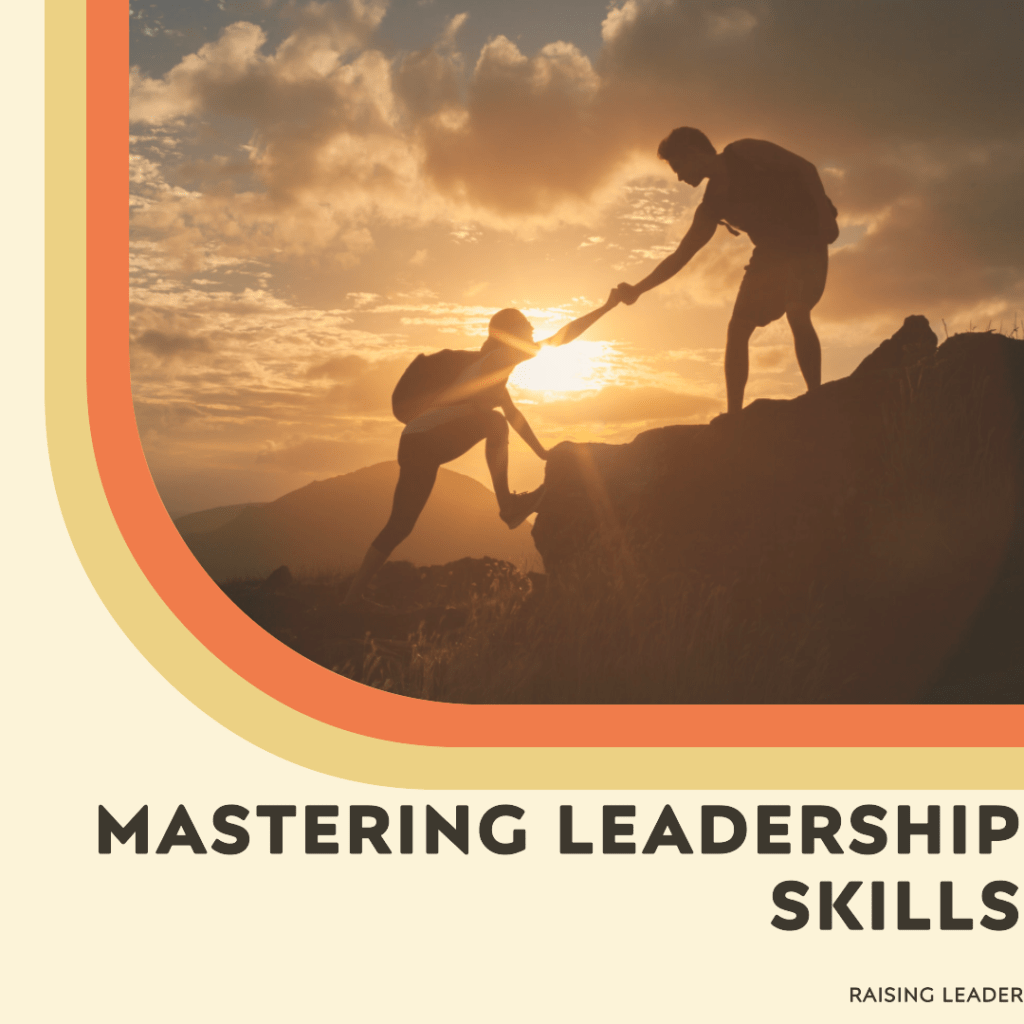Whether you want to admit it or not, Leadership is a critical skill that is essential in today’s world, whether you are a parent looking to enhance your parenting skills, a business leader seeking to improve your management skills, or just an individual seeking to enhance your personal growth.
It is that ability to inspire, guide, and influence others to achieve a common goal. Leadership is not just about managing people or delegating tasks, as parenting is not only about raising individuals, it is about inspiring them to become the best version of themselves.
In this article, we will explore the fundamentals of effective leadership, including the different leadership styles, the qualities of an excellent leader, and how to develop leadership skills.
1. Understanding Leadership
Leadership is the process of guiding and influencing individuals or groups to achieve a common goal. It involves a variety of skills, including communication, problem-solving, decision-making, and delegation. Effective leaders inspire and motivate their followers, creating a culture of excellence and innovation. As parents, we too are using leadership skills even if we are not aware of them by inspiring and motivating our children to become their best selves.
2. Different Leadership Styles
You might already be aware that there are multiple leadership styles, each with its advantages and disadvantages. These include:
Autocratic Leadership style
The autocratic leadership style also referred to as authoritarian, directive, or command-and-control leadership, involves a leader who wields complete control and makes decisions without taking input from others. Although this style may prove effective in certain circumstances, it can also be demotivating for team members who feel disempowered. I once worked with an organization where their manager adopted this leadership style, and it created a negative work environment where team members felt undervalued and unappreciated. This, in turn, led to many team members resigning, resulting in a significant loss of resources for the organization.
Democratic Leadership style
The democratic leadership style appears to strike a good balance, as leaders employing this style involve their followers in decision-making processes and place value on their feedback and opinions. During my time at an organization, I worked with a team leader who exhibited a democratic leadership style. He frequently convened meetings with team members to discuss issues and gather feedback, which fostered a collaborative work environment and boosted team morale. However, at that time, this approach led to slower decision-making due to the influx of new perspectives, which impacted the organization’s objectives and milestones.
Transformational Leadership style
I remember working with another organization, where the director demonstrated a transformational leadership style by inspiring and motivating the team towards a common goal. He provided a clear vision for the organization’s future, encouraged innovation and creativity, and was also highly charismatic. This transformational leadership style resulted in a highly motivated team, improved organizational performance, and team members who were developing their skills and taking ownership of their work. However, while transformational leadership can be effective in situations where change and growth are necessary, it can also lead to unrealistic expectations and a lack of focus.
Servant Leadership style
The first time I saw the Servant Leadership style was in a non-profit organization with whom we collaborated, where the founder exemplified servant leadership by prioritizing the needs of the team and the community they served. The founder worked tirelessly to support and empower team members, creating a positive work environment and fostering relationships. By putting the team’s needs first and regularly checking in with them to ensure they had the resources and support required to do their work effectively, the founder created a committed and passionate team. This approach led to the achievement of their goals and a positive impact on the community they served. Although servant leadership can be effective in situations where teamwork and collaboration are essential, it can also lead to a lack of direction and purpose if not implemented effectively.
3. Qualities of an Excellent Leader
Effective leaders possess a variety of qualities that help them inspire and motivate their followers. If you try to read between the lines above, you will notice that some of these qualities include:
- Vision: Effective leaders have a clear vision of where they want to go and how to get there.
- Communication: Leaders must communicate effectively with their followers, inspiring and motivating them to achieve their goals.
- Integrity: Leaders must be honest and ethical, leading by example and earning the trust of their followers.
- Empathy: Leaders must be able to understand and empathize with their followers, building strong relationships based on trust and respect.
- Adaptability: Leaders must be able to adapt to changing circumstances, making quick decisions and adjusting their strategies as necessary.
4. Developing Leadership Skills
We are all born with leadership skills, but perhaps in some cases, they are not yet developed enough, don’t worry, leadership skills can be developed through a variety of methods, including:
- Education and Training:
There are many courses and training programs available that can help you develop your leadership skills. Some good choices selected by us, you can find on our website, in the Resources section
- Mentorship:
Working with a mentor can be an excellent way to develop your leadership skills, as you can learn from their experience and expertise. This mentorship you get from our side through Raising Leader, by letting us know your particular case.
- Practice:
By reading this blog post, you have already taken the first step, asking yourself questions about what is leadership, what leadership skills are, and how they can be developed.
The more you practice your leadership skills, the better you will become. Look for opportunities to lead at work as well as at home, even in small ways.
5. Recommended eBooks for Improving Leadership Skills
There are many excellent eBooks available that can help you to start your leadership journey, but we already made some good selections for you, to save you time. Here are a few that we recommend. You can also find them in the Resources section, under E-Books:
- The 5 Levels of Leadership
- Leaders Eat Last
- The Art of Possibility
- Good to Great
- Emotional Intelligence 2.0
- The One Minute Manager
Each of these eBooks offers valuable insights into leadership and how to develop effective leadership skills, but for their practicality and use in real cases, Raising Leader is here to help and guide you in your journey.
6. Conclusion
As you can already imagine just by reading the above, Leadership is a critical skill that is essential in today’s business environment, but also equally important in our lives. Effective leaders inspire and motivate their followers, creating a culture of excellence and innovation. By understanding the different leadership styles, and qualities of an excellent leader, and how to develop those needed leadership skills, you can become a more effective and successful leader, also in raising your children.
7. FAQs
- What is the most effective leadership style?
There is no one-size-fits-all answer to this question, as different leadership styles can be effective in different situations. The most effective style will depend on the goals, needs, and personalities of the individuals and teams involved. Perhaps in some situations, the best will be a short-term mix of the above leadership styles.
- Is it possible for anyone to become a remarkable leader?
Absolutely! With the proper set of skills, training, and mindset, anyone can attain greatness in leadership. Leadership is a learned skill that can be enhanced and perfected through consistent practice and unwavering dedication. To improve your leadership skills, you may seek education and training, find a mentor as we are doing at Raising Leader to guide you, and continuously put your skills to the test through practical application.
- How can I improve my leadership skills?
You can improve your leadership skills through education and training, mentorship, and practice. Don’t hesitate to take on leadership roles, no matter how small they may seem. Ask for feedback from those around you (at work and home) to discover areas where you can improve your skills. Trying to play the role at home, is a big advantage because usually, our families are much more straightforward and transparent than our colleagues
- What are the most important qualities of an effective leader?
Some of the most important qualities of an effective leader include vision, communication, integrity, empathy, and adaptability.
- How can I inspire and motivate my team or my children?
Roughly speaking, you can inspire and motivate your team or your children at home, by setting clear goals and expectations, communicating effectively, providing feedback and recognition, and most important leading by example. Creating an environment where the members feel heard, appreciated, and respected is crucial. You should aim to foster a positive and supportive atmosphere that encourages personal and professional growth for everyone.




